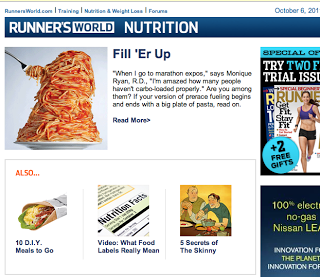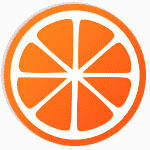When I was doing my nutrition training, over 10 years ago, sports nutrition went something like this: eat carbs and only carbs and before a race whatever that amount of carbs was multiply it by a factor of at least two. Once I started counseling runners and triathletes and running marathons myself I realized that no diet, especially not one where peak performance was the goal, could revolve around one macronutrient. My sports nutrition clients eat a diet similar to my other clients with the exception theirs may be more finely tuned. You can’t eat a trough of pasta and feel good the next day (sorry if the photo misled you).
So in comes a client last week, she’s training for the New York marathon and very savvy when it comes to training foods. “Did you see the new Runner’s World she asked? I told her I hadn’t. “There’s an article on carbo-loading and a ridiculous photo with a mountain of pasta.” I told her I’d check it out. I was going on a trip in a few days and I always bring a stack of magazines to devour. The next day, the client emailed. She sent me the link to the article, minutes later she sent another email with the message “you didn’t get the lovely pasta shot, so I took a screen shot, attached!” I explained I was saving the article but I was now extremely curious.
Friday, I boarded our early morning flight to New Orleans. I flipped open Runner’s World and found “Fill ‘Er Up. The article is love letter to the carb, specifically the white carb. It’s as imbalanced as Mount St. Pasta (pictured above). We’re told “most runners know they should eat pasta, rice, potatoes or other high-carb foods before a half or full marathon.” Immediately, I was thinking alone? What about omega 3’s for inflammation? Or vegetables for fluid and antioxidants? They’re clear though “carbs should make up 85 to 95 percent of your prerace meals.” Fruits, though high in carbs, are discouraged with the exception of bananas or peeled apples or pears. We’re warned other fruits may give you trouble. In the same paragraph the nutritionist quoted encourages her clients “to indulge in white bread and skinless while potatoes” since both are easily digested. I’m reading and getting incensed while airborne. I’m thinking since skinless potatoes and wonder bread break down into sugar, why not make things even easier and crack open the Domino box for dinner?
Carbs are an important part of an athlete’s diet during training and pre-race. Baked potatoes (with the skin), sweet potatoes, brown rice, sushi, quinoa and soba noodles, gluten free pasta and oats are some examples my clients enjoy. They are mostly “brown carbs” or “good” carbs and though some are fibrous, it’s not as though I’m advocating 5-alarm chili. There’s also the question of portion. In addition to the pasta picture, there’s an equally obscene stack of pancakes, caption “tall order”, and another nutritionist’s concern that we learn about carbohydrates “so you can toe the line fully fueled and ready to go.” I don’t think most runners or Americans need an introduction to carbohydrates (we’ve met thanks) nor encouragement to mainline them. If pasta’s your prerace preference, that’s fine but some fish or chicken and even salad will not kill you, if you’ve trained with these foods. In fact, they will help.
The author makes the point that as you taper/run less in the days leading up to a race, glycogen (stored carbs) accumulates. To me, “carbo loading” (would someone explain what a “carbo” is?) happens naturally as you store more carbs (in the new millennium we dropped the “o”) when you’re burning fewer. Another good point made is that you don’t need to increase your calories, just the proportion of carbs, leading up to the race. But there’s an adjacent
“good eats” sample day suggesting far from good foods such as bagels, sweetened yogurt, Gatorade, cookies, orange juice, Swedish Fish, chocolate milk oh and for some “easy to digest” fiber black beans and salsa. Now this day may put you in a diabetic coma or nauseate you but it will not make you perform better.
Though Runner’s World’s nutrition information can be a little dated, a few pages later there is a great recipe for Sweet Potato Muffins with ginger and whole-wheat flour from Mark Bittman. On page 46, Dr Weil suggests talks about fiber and anti-inflammatory foods. That made me feel a bit better, they had me worried we were back in the 90s for a minute. Have you trained for any type of race? What is your pre-race meal? What do you do when you read nutrition information that seems off? How do you feel when you eat a boatload of pasta?


